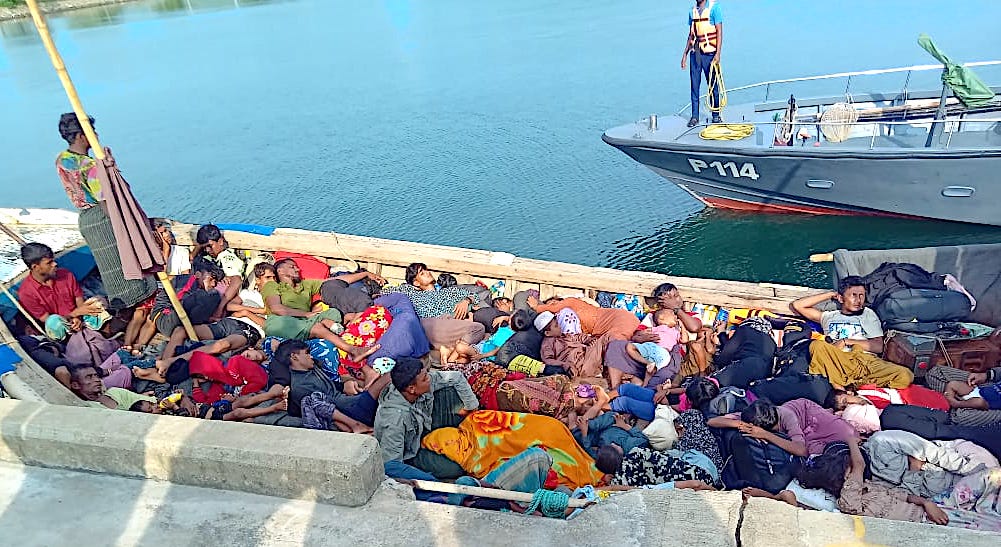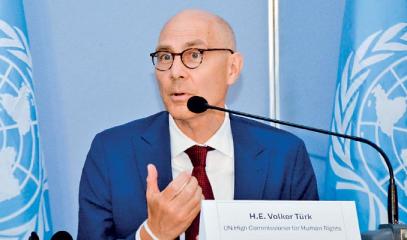Migrants, rights and reception: the new phase of the Colombo government
In recent days, the UN High Commissioner for Human Rights, Volker Türk, visited the island. Meetings were held with religious leaders, politicians and civil society figures. The issue of internal ‘accountability’ and the creation of an independent prosecutor to shed light on past abuses. The story of over a hundred Rohingya adrift off the north coast.
Colombo (AsiaNews) - Creating a system of internal ‘accountability’ in Sri Lanka that meets international standards, taking advantage of a period of stabilisation on the island after decades of violence and crisis, through the creation (among other things) of an independent prosecutor.
The four-day visit of UN High Commissioner for Human Rights Volker Türk to Colombo, which ended on 26 June with a meeting with President Anura Kumara Dissanayake, is part of a broader perspective of change.
The controversial Prevention of Terrorism Act (PTA) was discussed along with the many problems created by its implementation and teh subsequent requests for its repeal along with more decisivness on the issue of torture.
During his visit to Sri Lanka, Türk made official visits to various regions of the country, which has been ravaged by a decade-long war in the north and recent political crises that have not, however, undermined the goal of recovery.
In conclusion, the senior UN official confirmed his support for the authorities in Colombo in developing an accountability mechanism that meets international standards, needs, aspirations and expectations of victims. ‘We discussed how to create the figure of an independent prosecutor and how to build a national accountability system,’ he continued, adding that this remains an ongoing process, with human rights remaining an international concern.
Among the various meetings were those with political figures, religious leaders and members of civil society, as well as victims of human rights violations and abuses, who gave harrowing testimonies of abuse and violations.
He then recalled that the legacy of the past represents a significant challenge for the new government, while the UN office must ‘collect, compile and safeguard information’ by analysing cases of human rights violations.
‘During my meetings with religious leaders, I emphasised the fundamental role they play in promoting human rights and interfaith understanding,’ Türk concluded.
‘This is a key ingredient for a peaceful, harmonious and ethical society. In a world where incitement to hatred and religious hatred is becoming increasingly common, I urged them to use their influence to eradicate this phenomenon.’
The issue of human rights, hospitality and openness towards refugees is highly topical at this moment in the country's history, with growing calls for policies favourable to the most vulnerable sections of the population, both local and migrant.
‘Every human life is precious. Regardless of origin, belief or appearance, everyone has the right to live in peace, respect and freedom,’ says the message from the Sri Lanka Human Rights Commission, released on Migrants' Day.
This year's theme, “Solidarity with Refugees”, explains activists, reminds us that when people “work together in our cities, our countries and around the world, we can achieve great things”.
In recent times, the island has established itself as a landing point and place of welcome for refugees and asylum seekers. At the end of last year, the Colombo government took in a group of refugees who had been dragged into national waters.
On board were 118 people belonging to the Rohingya Muslim minority fleeing war and violence in Myanmar, who ended up adrift off the coast of Mullivaikkal, in Mullaitivu, in the north.
Local fishermen spotted the boat and provided humanitarian assistance, including water and food, before escorting the ship to the port of Trincomalee following the intervention of the Navy.
Currently, with greater stability achieved, Sri Lanka has become a destination for people fleeing civil unrest or conflict in other parts of the world.
As a result, 394 refugees/asylum seekers and 118 stateless persons have arrived in the last period, expressing concern for their safety in their countries of origin; some of them are living with local communities, while others are being held in three designated detention centres.
11/08/2017 20:05








.png)










